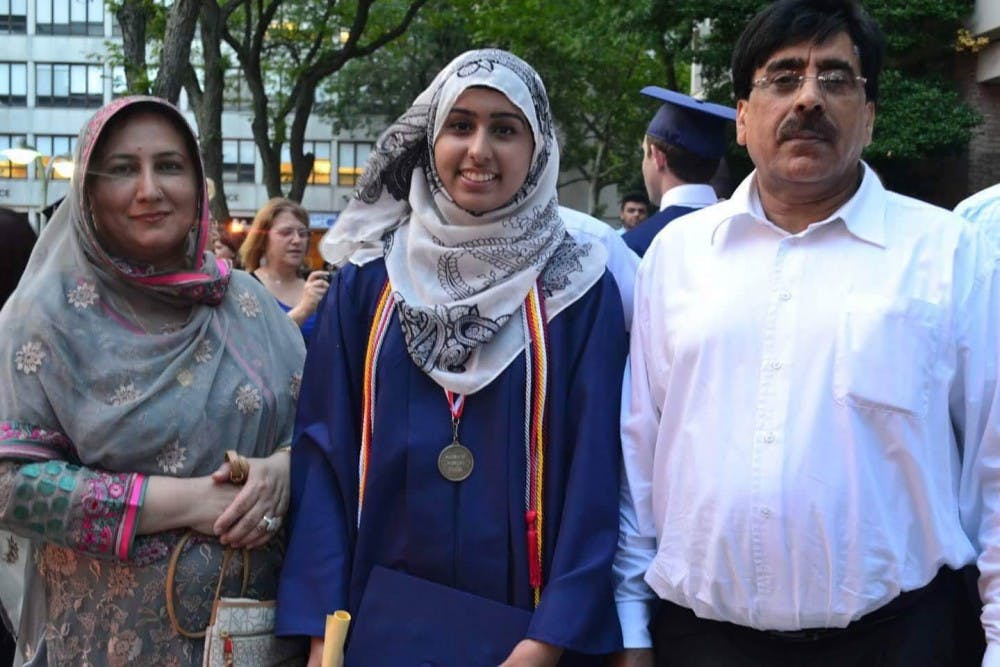Thirteen percent of the class of 2020 is composed of first–generation college students. However, as you’re about to find out, first–gen students are more than just a number—they aren’t just a selling point for the diversity section of a brochure. Their stories highlight the truth of what it means to be a part of the first–generation of children to obtain a college degree, a truth that comes with its highs and lows. Read on for a glimpse into the first–gen experience.
Nayab Khan (C '18)
“My dad immigrated from Pakistan to Germany and then he worked there for many, many years and then he came to the US, he worked as a taxi driver, at a gas station, at a store, and he did all of those menial, all of those small jobs and then eventually he opened up his own business and he says ‘If I can go this far ahead in life without a degree, you guys should be able to do way more,’” Nayab explains. Her father’s sentiments capture much of what being first–generation means for Nayab: a combination of challenges and pressures mixed with ambition and pride. While college is scary enough for anyone at the outset, Nayab feels a greater level of pressure to succeed because of the hard work of her parents to provide her such an opportunity, but the flip side of that pressure is a powerful sense of motivation to serve a larger purpose. In addition to studying biology and working towards dental school, Nayab recently sub–matriculated into the non–profit leadership master’s program in the School of Social Policy & Practice, combining her personal passions and the work ethic to go beyond what her father instilled in her. Nayab recalls visits to Pakistan where her father muses about all the good they could do once Nayab finishes dental school, “’We can start farming here or build, like, a hospital or dental hospital for you and your sister to help the poor here,’ these are the thoughts that go through my dad’s mind and that’s what encourages us to not just have a very basic career, not that being a dentist or doctor is basic, but going beyond that and push yourself.”
Still, along with the joy Nayab finds in her identity she notes that many Penn students don’t seem to care about the extra barriers first–gen students face. More than just a percentage of the student body, when we think about first–gen students Nayab notes that, “[Y]ou need to understand these kids are here and it was harder for them to get here.” While being first–gen has shaped Nayab positively, she makes it clear that Penn at large needs to understand the realities that first–gen students face, from the challenges to the triumphs.
Jose Maciel (N '19)

Jose hails from a town called Yakima, Washington. He and his sister are the first in his family to attend college, and Jose is the first to travel across the country to do it. “Everyone goes to community college where I’m from,” he mentions.
While he has noticed a gap between first–gen students and a majority of Penn’s student body, Jose deals with it in a variety of ways, such as working multiple jobs. He even fixes broken iPhone screens, a skill that took him eight hours of self–training to acquire. Unfortunately for Jose, he says that getting involved in extracurriculars has been particularly hard for him. “I feel like I have to focus myself academically because if I don’t have enough time to focus on my academics, things would go bad with my grades.” He’s in the Alpha Sig fraternity, and hopes to get involved with Penn Outdoors and PennFirst this semester.
David Thai (C '18)

For David, being first–gen can take an emotional toll, not to mention the problem of the ever– looming resource gap that comes with being both first–gen and low–income. “I’m always feeling like it’s a constant uphill battle… I came from, like, a really low place and started off really low and as we’re all learning and in class, we’re all moving upwards, but there’s still that gap that separates me from most students,” he says. His unexplored inequality is important because the resource gap extends past academics and into everything, from how students are able to present themselves to how they can afford to socialize. But, perhaps the biggest issue is in the emotional impact that gap creates, “[F]or me I wake up every morning and I’m grateful to even wake up in my own bed because I grew up in a bedroom for 18 years of my life with two brothers living on the same bed and like to wake up and have my own bed, to have my own desk, to have Wifi…but, walking down Locust Walk I never feel like I deserve to be here, but rather I feel like I’m lucky to be here.”


